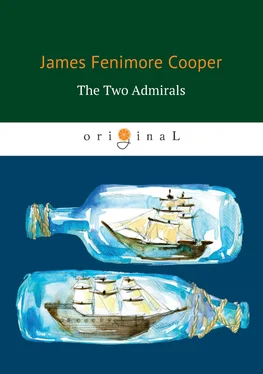Джеймс Фенимор Купер - The Two Admirals
Здесь есть возможность читать онлайн «Джеймс Фенимор Купер - The Two Admirals» — ознакомительный отрывок электронной книги совершенно бесплатно, а после прочтения отрывка купить полную версию. В некоторых случаях можно слушать аудио, скачать через торрент в формате fb2 и присутствует краткое содержание. Город: Москва, Год выпуска: 2018, ISBN: 2018, Жанр: Исторические приключения, Прочие приключения, literature_19, Морские приключения, на английском языке. Описание произведения, (предисловие) а так же отзывы посетителей доступны на портале библиотеки ЛибКат.
- Название:The Two Admirals
- Автор:
- Жанр:
- Год:2018
- Город:Москва
- ISBN:978-5-521-06651-3
- Рейтинг книги:3 / 5. Голосов: 1
-
Избранное:Добавить в избранное
- Отзывы:
-
Ваша оценка:
- 60
- 1
- 2
- 3
- 4
- 5
The Two Admirals: краткое содержание, описание и аннотация
Предлагаем к чтению аннотацию, описание, краткое содержание или предисловие (зависит от того, что написал сам автор книги «The Two Admirals»). Если вы не нашли необходимую информацию о книге — напишите в комментариях, мы постараемся отыскать её.
The Deerslayer
The Two Admirals — читать онлайн ознакомительный отрывок
Ниже представлен текст книги, разбитый по страницам. Система сохранения места последней прочитанной страницы, позволяет с удобством читать онлайн бесплатно книгу «The Two Admirals», без необходимости каждый раз заново искать на чём Вы остановились. Поставьте закладку, и сможете в любой момент перейти на страницу, на которой закончили чтение.
Интервал:
Закладка:
“Both were lineal descendants of the Conqueror, and of the Saxon princes; and both united the double titles to the throne, in their sacred persons. I have always considered Charles II. as the victim of the rebellious conduct of his subjects, rather than vicious. He was driven abroad into a most corrupt state of society, and was perverted by our wickedness. As to the father, he was the real St. Charles, and a martyred saint he was; dying for true religion, as well as for his legal rights. Then the Edwards – glorious fellows! – remember that they were all but one Plantagenets; a name, of itself, to rouse an Englishman’s fire!”
“And yet the only difference between the right of these very Plantagenets to the throne, and that of the reigning prince, is, that one produced a revolution by the strong hand, and the other was produced by a revolution that came from the nation. I do not know that your Plantagenets ever did any thing for a navy; the only real source of England’s power and glory. D – – e, Dick, if I think so much of your Plantagenets, after all!”
“And yet the name of Oakes is to be met with among their bravest knights, and most faithful followers.”
“The Oakes, like the pines, have been timbers in every ship that has floated,” returned the vice-admiral, half-unconscious himself, of the pun he was making.
For more than a minute Sir Gervaise continued his walk, his head a little inclined forward, like a man who pondered deeply on some matter of interest. Then, suddenly stopping, he turned towards his friend, whom he regarded for near another minute, ere he resumed the discourse.
“I wish I could fairly get you to exercise your excellent reason on this matter, Dick,” he said, after the pause; “then I should be certain of having secured you on the side of liberty.”
Admiral Bluewater merely shook his head, but he continued silent, as if he deemed discussion altogether supererogatory. During this pause, a gentle tap at the door announced a visiter; and, at the request to enter, Atwood made his appearance. He held in his hand a large package, which bore on the envelope the usual stamp that indicated it was sent on public service.
“I beg pardon, Sir Gervaise,” commenced the secretary, who always proceeded at once to business, when business was to be done; “but His Majesty’s service will not admit of delay. This packet has just come to hand, by the arrival of an express, which left the admiralty only yesterday noon.”
“And how the devil did he know where to find me!” exclaimed the vice-admiral, holding out a hand to receive the communication.
“It is all owing to this young lieutenant’s forethought in following up the Jacobite intelligence to a market-town. The courier was bound to Falmouth, as fast as post-horses could carry him, when he heard, luckily, that the fleet lay at anchor, under Wychecombe Head; and, quite as luckily, he is an officer who had the intelligence to know that you would sooner get the despatches, if he turned aside, and came hither by land, than if he went on to Falmouth, got aboard the sloop that was to sail with him, for the Bay of Biscay, and came round here by water.”
Sir Gervaise smiled at this sally, which was one in keeping with all Atwood’s feelings; for the secretary had matured a system of expresses, which, to his great mortification, his patron laughed at, and the admiralty entirely overlooked. No time was lost, however, in the way of business; the secretary having placed the candles on a table, where Sir Gervaise took a chair, and had already broken a seal. The process of reading, nevertheless, was suddenly interrupted by the vice-admiral’s looking up, and exclaiming –
“Why, you are not about to leave us, Bluewater?”
“You may have private business with Mr. Atwood, Sir Gervaise, and perhaps I had better retire.”
Now, it so happened that while Sir Gervaise Oakes had never, by look or syllable, as he confidently believed, betrayed the secret of his friend’s Jacobite propensities, Atwood was perfectly aware of their existence. Nor had the latter obtained his knowledge by any unworthy means. He had been neither an eavesdropper, nor an inquirer into private communications, as so often happens around the persons of men in high trusts; all his knowledge having been obtained through native sagacity and unavoidable opportunities. On the present occasion, the secretary, with the tact of a man of experience, felt that his presence might be dispensed with; and he cut short the discussion between the two admirals, by a very timely remark of his own.
“I have left the letters uncopied, Sir Gervaise,” he said, “and will go and finish them. A message by Locker” – this was Sir Gervaise’s body-servant – “will bring me back at a moment’s notice, should you need me again to-night.”
“That Atwood has a surprising instinct, for a Scotchman!” exclaimed the vice-admiral, as soon as the door was closed on the secretary. “He not only knows when he is wanted, but when he is not wanted. The last is an extraordinary attainment, for one of his nation.”
“And one that an Englishman may do well to emulate,” returned Bluewater. “It is possible my company may be dispensed with, also, just at this important moment.”
“You are not so much afraid of the Hanoverians, Dick, as to run away from their hand-writing, are ye? Ha – what’s this? – As I live, a packet for yourself, and directed to ‘Rear-Admiral Sir Richard Bluewater, K.B.’ By the Lord, my old boy, they’ve given you the red riband at last! This is an honour well earned, and which may be fitly worn.”
“’Tis rather unexpected, I must own. The letter, however, cannot be addressed to me, as I am not a Knight of the Bath.”
“This is rank nonsense. Open the packet, at once, or I will do it for you. Are there two Dick Bluewaters in the world, or another rear-admiral of the same name?”
“I would rather not receive a letter that does not strictly bear my address,” returned the other, coldly.
“As I’ll be sworn this does. But hand it to me, since you are so scrupulous, and I will do that small service for you.”
As this was said, Sir Gervaise tore aside the seals; and, as he proceeded rather summarily, a red riband was soon uncased and fell upon the carpet. The other usual insignia of the Bath made their appearance, and a letter was found among them, to explain the meaning of all. Every thing was in due form, and went to acquaint Rear-Admiral Bluewater, that His Majesty had been graciously pleased to confer on him one of the vacant red ribands of the day, as a reward for his eminent services on different occasions. There was even a short communication from the premier, expressing the great satisfaction of the ministry in thus being able to second the royal pleasure with hearty good will.
“Well, what do you think of that, Richard Bluewater?” asked Sir Gervaise, triumphantly. “Did I not always tell you, that sooner or later, it must come?”
“It has come too late, then,” coldly returned the other, laying the riband, jewels, and letters, quietly on the table. “This is an honour, I can receive, now , only from my rightful prince. None other can legally create a knight of the Bath.”
“And pray, Mr. Richard Bluewater, who made you a captain, a commander, a rear-admiral? Do you believe me an impostor, because I wear this riband on authority no better than that of the house of Hanover? Am I, or am I not, in your judgment, a vice-admiral of the red?”
“I make a great distinction, Oakes, between rank in the navy, and a mere personal dignity. In the one case, you serve your country, and give quite as much as you receive; whereas, in the other, it is a grace to confer consideration on the person honoured, without such an equivalent as can find an apology for accepting a rank illegally conferred.”
Читать дальшеИнтервал:
Закладка:
Похожие книги на «The Two Admirals»
Представляем Вашему вниманию похожие книги на «The Two Admirals» списком для выбора. Мы отобрали схожую по названию и смыслу литературу в надежде предоставить читателям больше вариантов отыскать новые, интересные, ещё непрочитанные произведения.
Обсуждение, отзывы о книге «The Two Admirals» и просто собственные мнения читателей. Оставьте ваши комментарии, напишите, что Вы думаете о произведении, его смысле или главных героях. Укажите что конкретно понравилось, а что нет, и почему Вы так считаете.












